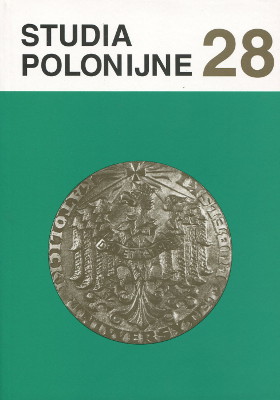Inkulturacyjna rola parafii polonijnej w USA na przykładzie wybranych parafii polonijnych z Chicago, Detroit i Nowego Jorku (1867-1976)
The Incultural Role of the Polish Parish in the USA as Instanced by Some Polish Parishes in Chicago, Detroit and New York (1867-1976)
Author(s): Magdalena CzerwińskaSubject(s): Christian Theology and Religion, History of Church(es), Theology and Religion
Published by: Towarzystwo Naukowe KUL & Katolicki Uniwersytet Lubelski Jana Pawła II
Summary/Abstract: The Polish national parishes have played a principal role in the process of the inculturation of Polish immigrants with American society. Polish priests carried out the agenda of emigrant pastoral care. It was important on this agenda to maintain a tie with the Catholic faith and Polish culture, and this was gradually combined with various elements of local culture. Working on behalf of the prestige and status of the Polish ethnic group in America, they sought to improve its education, to gain a better command of the English language, and helped in making their stay legal by obtaining American citizenship. The priests shaped civic loyalty of Polonia members, and developed their patriotic feelings towards the new Homeland. The Polish parish priests themselves were also representatives of the authority of local bishops who were their superiors. Thereby they were linking factors between the ethnic parish and the Catholic Church in the USA.The Polish national parishes in the structures and financial system of the Catholic Church in America played a special role in the process of integration between Catholic Polonia and the American world. Although the Polish parishes have maintained and partly still maintain their ethnic character since the beginning of their existence, they have been established according to the model of religious structures popular in America. Moreover, the Polish parishes in the USA were subordinate to local bishops, diocesan ordinary bishops and, according to canon and civil law, were parts of one Catholic community in the multiethnic and multireligious American society.The inculturation of Polonia in the United States was also carried out through linguistic assimilation in parishes. The tendencies to make the English language popular as the everyday means of communication were apparent already among the members of the second generation of Polish immigrants. The Polish parishes had cultural societies whose members studied the output of English and American literature and art. Linguistic assimilation in Polish parishes and schools that belonged to them was carried out through a gradual shift from an ethnic language – Polish – to bilingual attitudes and the main or only use of the English language. From the 1940s on there was a rapid reverse from the teaching of the Polish language and the so-called home subjects in parochial schools.After the First World War, the authorities of the Catholic Church in America favoured the separate character and development of parishes and ethnic schools. In the inter-war period, however, they worked on behalf of a more rapid and complete Americanisation. The „melting pot” policy of the state had an enormous influence on the acceleration of assimilation processes among the members of national parishes. It was supported by some Catholic American bishops, mainly those of Anglo-Saxon origin. According to this conception and ideology, the society of the United States should be like a large and homogenous melting pot in which all national, cultural, and religious differences brought to the USA by such numerous national groups of immigrants would be melted and unified.
Journal: Studia Polonijne
- Issue Year: 2007
- Issue No: 28
- Page Range: 243-272
- Page Count: 30
- Language: Polish

